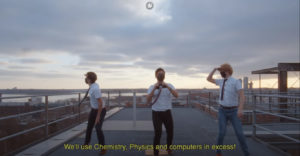The pace of scientific discovery today moves at an alarming rate, and often there are great challenges in communicating scientific concepts that many would believe you need a masters degree to understand. However, many scientists and researchers are finding unique ways to share the knowledge that they are creating with the wider world to the benefit of all, both in entertainment value and dissemination of information.
Recently, Ars Technica covered the 13th year of the "Dance your Ph.D." contest, with entrants from the fields of physics, chemistry, biology, and social sciences hailing from around the world, and creating some amazing content that is both a joy to watch and scientifically accurate and informative. The winners hailed from Helsinki and filmed their video in a Covid safe and extremely cold environment, fighting both the elements and interference from the local meteorological institute. The winner, Jakub Kubecka won this contest with a hip hop music video dance based on his work on the physics of atmospheric molecular clusters. We are impressed by all of the entrants work and know that their work will inspire other scientists to seek new and innovative ways to communicate their own research.
Obviously the importance of scientific communication has been at the forefront of many people's minds this years with the Covid-19 epidemic forcing people around the world to delve more deeply into the world of virology than they had ever thought they would. This has also provided the opportunity to develop communication tools that are not only scientifically accurate, but can save lives simply by disseminating accurate information about the virus. A recent Washingtonian article highlighted the work of many graphic designers who have developed a series of posters that you can print and use in your own life, many of which were both poignant and stunningly beautiful.
The more that people are able to engage with science and develop their own scientific literacy, the better situations like the recent pandemic can be handled. And while not everyone will likely go out and get a Ph.D. in computational chemistry or microbiology, understanding the scientific concepts that can affect our everyday lives, from climate change to medical research, is a valuable endeavor for all.
